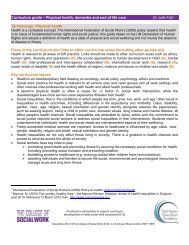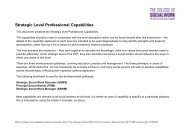PCF capabilities - ASYE - The College of Social Work
PCF capabilities - ASYE - The College of Social Work
PCF capabilities - ASYE - The College of Social Work
You also want an ePaper? Increase the reach of your titles
YUMPU automatically turns print PDFs into web optimized ePapers that Google loves.
• Identify and implement strategies for responding appropriately to concerns about practice or procedures, seeking guidance if required<br />
2. Values and Ethics: Apply social work ethical principles and values to guide pr<strong>of</strong>essional practice<br />
<strong>Social</strong> workers have an obligation to conduct themselves ethically and to engage in ethical decision-making, including through partnership<br />
with people who use their services. <strong>Social</strong> workers are knowledgeable about the value base <strong>of</strong> their pr<strong>of</strong>ession, its ethical standards and<br />
relevant law.<br />
• Understand and apply the pr<strong>of</strong>ession’s ethical principles and legislation, taking account <strong>of</strong> these in reaching decisions<br />
• Recognise, and manage the impact <strong>of</strong> your own values on pr<strong>of</strong>essional practice<br />
• Recognise and manage conflicting values and ethical dilemmas to arrive at principled decisions<br />
• Demonstrate respectful partnership work with service users and carers, eliciting and respecting their needs and views, and promoting<br />
their participation in decision-making wherever possible<br />
• Recognise and promote individuals’ rights to autonomy and self-determination<br />
• Promote and protect the privacy <strong>of</strong> individuals within and outside their families and networks, recognising the requirements <strong>of</strong><br />
pr<strong>of</strong>essional accountability and information sharing<br />
3. Diversity: Recognise diversity and apply anti-discriminatory and anti-oppressive principles in practice<br />
<strong>Social</strong> workers understand that diversity characterises and shapes human experience and is critical to the formation <strong>of</strong> identity. Diversity is<br />
multi- dimensional and includes race, disability, class, economic status, age, sexuality, gender and transgender, faith and belief. <strong>Social</strong><br />
workers appreciate that, as a consequence <strong>of</strong> difference, a person’s life experience may include oppression, marginalisation and alienation as<br />
well as privilege, power and acclaim, and are able to challenge appropriately.<br />
• Identify and take account <strong>of</strong> the significance <strong>of</strong> diversity and discrimination on the lives <strong>of</strong> people, and show application <strong>of</strong> this<br />
understanding in your practice<br />
v2 November 2012 ©<strong>The</strong> <strong>College</strong> <strong>of</strong> <strong>Social</strong> <strong>Work</strong> 2012 2-4 Cockspur Street London SW1Y 5BH Company No.07499397












